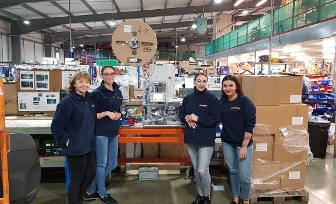Parkinson Harness Technology Ltd

About Parkinson Harness Technology
Parkinson Harness Technology (PHT) originally started trading back in 1973 as a subsidiary of CF Parkinson.
Specialising in the manufacture of wiring harnesses the subsidiary grew rapidly in its own right until, in 2002, the decision was taken to establish the Harness Technology business as a stand-alone limited company.
The business now turns over around £10m a year and employs over 150 employees working from their site in Boston.
The business offers electrical wiring solutions for many sectors including construction and agricultural machinery, as well as municipal vehicles, catering equipment and many other applications. This includes: wire harnesses, battery leads, power leads and control panels. The company is at the leading edge in its market for the provision of power cables for high voltage E-vehicles.
The Challenge
With increased sales the area of the business responsible for fitting the terminals and weather seals onto the cables found that it was struggling to keep pace with orders. Bottlenecks in the manufacturing process were starting to appear which had a damaging effect on productivity and in turn the profitability of certain jobs.
Having looked at the options the business decided that it could no longer solely rely on manual labour to fit the seals and that some sort of automation was required.
After much research the decision was made to invest in a Komax bt752, a piece of equipment that would not only improve the speed of the operation but would also reduce wastage, tool damage and maintain the highest quality assurance standards demanded by their customers.
David Earnshaw, PHT's' Managing Director said that "Unfortunately machines like this don't come cheap; they are complex pieces of equipment that need to perform reliably and to the highest standards. It was going to be a big investment for us, so finding a way of making it more affordable was important if we were to act quickly and resolve the problem."
The solution
After hearing about the possibility of a grant from a business advisor, David decided to give Grants4Growth a call to see if it was something that they may be able to support. Having established that both the business and the type of investment were in fact eligible for European funding support David was contacted by one of the Grants4Growth business brokers who helped him complete the application for funding.
Within two weeks their grant application had been assessed and a £11,500 contribution towards the purchase of the new machine had been agreed.
Since purchasing the new machine in October 2017 the business has seen substantial improvements in productivity, as the previous three-stage process has been replaced by a single automated task.
Through this investment, PHT has substantially increased its capacity for this task compared to the situation prior to purchasing the Komax bt752, releasing labour for increased demand in other parts of the manufacturing process.
What's next?
PHT will continue to strive for improvements in productivity in order to stay ahead of its competition. In 2018, David's main challenge will continue to be the instability of Sterling and the uncertainty it brings to his cost base. Re-negotiating import costs will remain a key management objective if the business is to continue to develop and grow.
"We've been significantly affected by exchange rate movement in the last 18 months, but we intend to continue innovating and driving up productivity to allow us to grow and diversify in the future"
"From our perspective the Grants4Growth program has helped us significantly; the process was slick and painless. It allowed us to act quickly and make the changes that were needed to help us grow"




